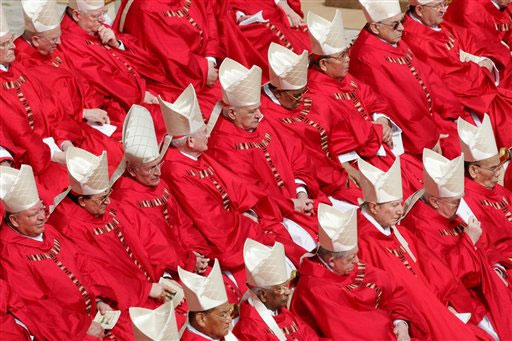+AMDG+
 Whenever the consistory rolls around, I’m always curious to see which scholarly octogenarians receive the red hat honoris causa. Seeing a Jesuit among the cardinal-designates is always significant, inasmuch as it suggests the sort of theological service the Holy Father hopes for from the Society of Jesus. This year’s consistory singled out for honorable mention Fr. Karl J. Becker, S.J., emeritus professor of theology at the Gregorian University in Rome. Since he is unlikely to be a household name even among the churchgoers, I thought I would give a brief theological introduction.
Whenever the consistory rolls around, I’m always curious to see which scholarly octogenarians receive the red hat honoris causa. Seeing a Jesuit among the cardinal-designates is always significant, inasmuch as it suggests the sort of theological service the Holy Father hopes for from the Society of Jesus. This year’s consistory singled out for honorable mention Fr. Karl J. Becker, S.J., emeritus professor of theology at the Gregorian University in Rome. Since he is unlikely to be a household name even among the churchgoers, I thought I would give a brief theological introduction.
On the matter of theological style, I found the following thumbnail sketch, culled from the editors of his Spanish-language Festschrift, Sentire cum Ecclesia: Homenaje al P. Josef K. Becker, S.J. According to a reviewer of this volume,
The editors … highlight in the introduction three characteristics of Becker’s theological project, to wit: the importance that history has in his theological expositions (which gives them seriousness and rigor); the fact that he is not a theologian inclined to let himself get carried away by the latest currents of fashion (which leads him to a deep and serene reflection on the themes that that he treats); and his estimation of the Catholic faith as the point of departure for the theological task. Nevertheless—and the editors underscore this as well—Fr. Becker has not created a school and his students situate themselves within different theological climates, orientations and styles.
One can see the justice of this description in Fr. Becker’s work. It seems unlikely that his dissertation-turned-book, for instance, Die Rechtfertigungslehre nach Domingo de Soto. Das Denken eines Konzilstellnehmers vor, in und nach Trient [The Doctrine of Justification According to Domingo de Soto: The Thought of a Council Participant Before, During, and After Trent] (1967), was ever on the bleeding edge of theology. It did, however, provide the expertise necessary for Fr. Becker to teach meat-and-potatoes courses, such as De Gratia, at the Greg for more than 30 years.
Toward the end of his career, Fr. Becker did turn his attention to the Church and world religions, topics of considerable contemporary interest. He did not, however, tend to take the trendiest positions on these matters. Of special note is his contribution to the longstanding debate over the interpretation of Lumen Gentium ¶8, which stated that the Church of Christ “subsists in” (subsistit in) the Catholic Church. Since Mystici Corporis (1943) ¶34 had previously taught that the Church of Christ “is” (est) the Catholic Church, many interpreted the change of phrasing to represent a change of doctrine: in other words, the Catholic Church could no longer claim to be the one, true Church of Christ. She could claim that the Church of Christ was “in” her, but without excluding the possibility that she was equally “in” other churches (or even religions).
This inclusivist interpretation was strongly disputed by one of Fr. Becker’s doctoral students, the German lay-woman Alexandra von Teuffenbach. Teuffenbach’s archival research showed that subsistit in was proposed by none other than Fr. Sebastian Tromp, S.J, the well-known “ghost-writer” of Mystici Corporis and outspoken member of the Council’s so-called “conservative” minority. The rationale that Tromp gave for proposing this particular formulation, moreover, was precisely that of safeguarding the exclusive identification of the true Church of Christ with the Catholic Church (without denying that ecclesial “elements” exist outside her). Relying partly on Teuffenbach’s findings, Becker became one of the more eminent voices arguing that the “subsistit in” of Lumen Gentium is a precision—not a reversal—of the “est” of Mystici Corporis.
Fr. Becker has also served as consultor to the CDF since Sept. 15, 1977, where he has earned a reputation for combining orthodoxy with fairness. Nearly 10 years ago Vatican insider John Allen remarked on his influence, “Becker enjoys the respect and trust of Cardinal Joseph Ratzinger, prefect of the doctrinal congregation. More than one theologian in trouble has been advised to ‘go see Fr. Becker.'” Ratzinger doubtlessly valued Fr. Becker’s balanced scholarship, his generous assistance to the Church, and his courage in defending unpopular positions. The title of Fr. Becker’s Festschrift, Sentire cum Ecclesia [Thinking with the Church], moreover, suggests that his former students shared this appreciation. By bestowing the red hat, Benedict is holding up these typically Ignatian qualities for emulation.
APSJ


A beautiful reflection.
Another Jesuit whom it may be interesting to hear about could be Father Edward Dowling SJ, who was an advisor to Bill W and Doctor Bob (co founders of Alcoholics Anonymous)
Beyond that I can find so little about him. It would certainly be enriching to know about God’s gift of the Twelve Steps which helped so many alcoholics (and, later, those who suffered other addictions) by healing the spiritual parts of the illness in cases where medical science was not sufficient.
Friends in high places, as with C. Avery Dulles S.J. and C. Laveda; rewards for thinking and working with and alongside fellow prelates brings its rewards, rewards and recognitions that are well deserved.
[…] I posted a theological introduction to cardinal-designate Fr. Karl Josef Becker some weeks back, Fr. Becker has ceased to be cardinal-designate, at least for the time being. A […]
[…] San Giuliano Martire. To learn more about Cardinal Becker’s scholarly work as a theologian, click here; to learn about his new titular church of San Giuliano Martire, visit the parish […]